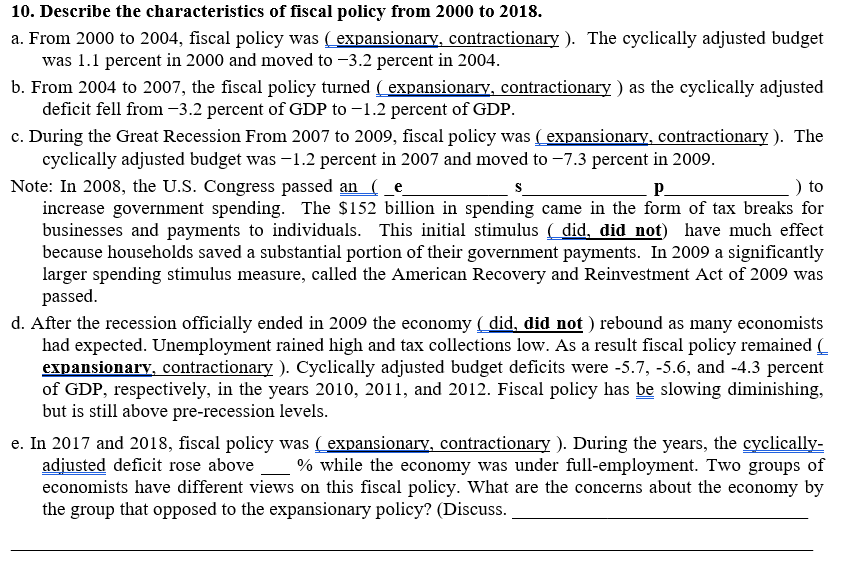10. Describe the characteristics of fiscal policy from 2000 to 2018. a. From 2000 to 2004, fiscal policy was ( expansionary, contractionary ). The cyclically adjusted budget was 1.1 percent in 2000 and moved to -3.2 percent in 2004. b. From 2004 to 2007, the fiscal policy turned ( expansionary, contractionary ) as the cyclically adjusted deficit fell from -3.2 percent of GDP to -1.2 percent of GDP. c. During the Great Recession From 2007 to 2009, fiscal policy was ( expansionary, contractionary ). The cyclically adjusted budget was -1.2 percent in 2007 and moved to -7.3 percent in 2009. Note: In 2008, the U.S. Congress passed an ( _e_ increase government spending. The $152 billion in spending came in the form of tax breaks for businesses and payments to individuals. This initial stimulus ( did, did not) have much effect because households saved a substantial portion of their government payments. In 2009 a significantly larger spending stimulus measure, called the American Recovery and Reinvestment Act of 2009 was passed. P. ) to
10. Describe the characteristics of fiscal policy from 2000 to 2018. a. From 2000 to 2004, fiscal policy was ( expansionary, contractionary ). The cyclically adjusted budget was 1.1 percent in 2000 and moved to -3.2 percent in 2004. b. From 2004 to 2007, the fiscal policy turned ( expansionary, contractionary ) as the cyclically adjusted deficit fell from -3.2 percent of GDP to -1.2 percent of GDP. c. During the Great Recession From 2007 to 2009, fiscal policy was ( expansionary, contractionary ). The cyclically adjusted budget was -1.2 percent in 2007 and moved to -7.3 percent in 2009. Note: In 2008, the U.S. Congress passed an ( _e_ increase government spending. The $152 billion in spending came in the form of tax breaks for businesses and payments to individuals. This initial stimulus ( did, did not) have much effect because households saved a substantial portion of their government payments. In 2009 a significantly larger spending stimulus measure, called the American Recovery and Reinvestment Act of 2009 was passed. P. ) to
Chapter24: Fiscal Policy
Section: Chapter Questions
Problem 5P
Related questions
Question

Transcribed Image Text:10. Describe the characteristics of fiscal policy from 2000 to 2018.
a. From 2000 to 2004, fiscal policy was (expansionary, contractionary ). The cyclically adjusted budget
was 1.1 percent in 2000 and moved to -3.2 percent in 2004.
b. From 2004 to 2007, the fiscal policy turned ( expansionary, contractionary ) as the cyclically adjusted
deficit fell from –3.2 percent of GDP to -1.2 percent of GDP.
c. During the Great Recession From 2007 to 2009, fiscal policy was (expansionary, contractionary ). The
cyclically adjusted budget was -1.2 percent in 2007 and moved to -7.3 percent in 2009.
Note: In 2008, the U.S. Congress passed an (_e
increase government spending. The $152 billion in spending came in the form of tax breaks for
businesses and payments to individuals. This initial stimulus ( did, did not) have much effect
because households saved a substantial portion of their government payments. In 2009 a significantly
larger spending stimulus measure, called the American Recovery and Reinvestment Act of 2009 was
passed.
P.
) to
d. After the recession officially ended in 2009 the economy ( did, did not ) rebound as many economists
had expected. Unemployment rained high and tax collections low. As a result fiscal policy remained (
expansionary, contractionary ). Cyclically adjusted budget deficits were -5.7, -5.6, and -4.3 percent
of GDP, respectively, in the years 2010, 2011, and 2012. Fiscal policy has be slowing diminishing,
but is still above pre-recession levels.
e. In 2017 and 2018, fiscal policy was ( expansionary, contractionary ). During the years, the cyclically-
adjusted deficit rose above % while the economy was under full-employment. Two groups of
economists have different views on this fiscal policy. What are the concerns about the economy by
the group that opposed to the expansionary policy? (Discuss.
Expert Solution
This question has been solved!
Explore an expertly crafted, step-by-step solution for a thorough understanding of key concepts.
This is a popular solution!
Trending now
This is a popular solution!
Step by step
Solved in 2 steps

Knowledge Booster
Learn more about
Need a deep-dive on the concept behind this application? Look no further. Learn more about this topic, economics and related others by exploring similar questions and additional content below.Recommended textbooks for you

Exploring Economics
Economics
ISBN:
9781544336329
Author:
Robert L. Sexton
Publisher:
SAGE Publications, Inc

Principles of Economics 2e
Economics
ISBN:
9781947172364
Author:
Steven A. Greenlaw; David Shapiro
Publisher:
OpenStax


Exploring Economics
Economics
ISBN:
9781544336329
Author:
Robert L. Sexton
Publisher:
SAGE Publications, Inc

Principles of Economics 2e
Economics
ISBN:
9781947172364
Author:
Steven A. Greenlaw; David Shapiro
Publisher:
OpenStax


Brief Principles of Macroeconomics (MindTap Cours…
Economics
ISBN:
9781337091985
Author:
N. Gregory Mankiw
Publisher:
Cengage Learning

Principles of Macroeconomics (MindTap Course List)
Economics
ISBN:
9781285165912
Author:
N. Gregory Mankiw
Publisher:
Cengage Learning

Principles of Economics, 7th Edition (MindTap Cou…
Economics
ISBN:
9781285165875
Author:
N. Gregory Mankiw
Publisher:
Cengage Learning